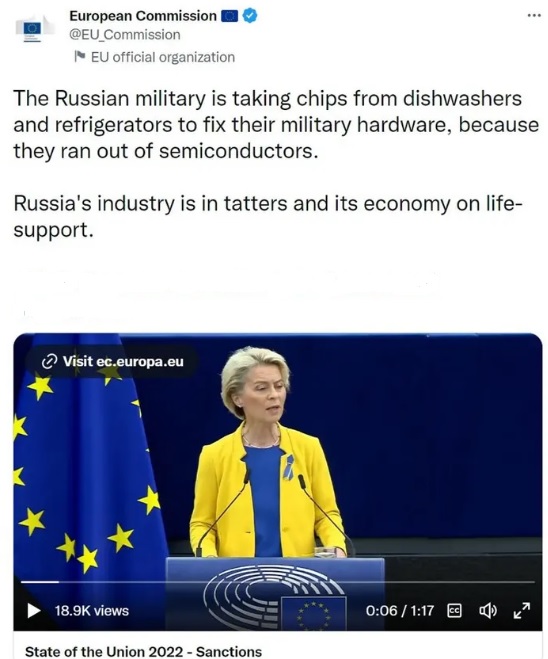 Look at the stupid things Ursula said in 2022. Europe lives in a fantasy world. This lie will lead Europe to collapse!
Look at the stupid things Ursula said in 2022. Europe lives in a fantasy world. This lie will lead Europe to collapse!
All four pillars of the EU’s economic strategy and great power project now lie in ruins. Every domino has fallen, ‘The Telegraph’ writes.
Europe sub-contracted its energy supply to Russia, its defence to America and its manufacturing supply-chains to China. The hurricane of events over the last five years have exposed the blind complacency behind those bad bets.
It is less understood that Europe also sub-contracted its aggregate demand to the rest of the world over long stretches of the last quarter century. It relied on an open global trading system, kept that way by American power and willingness to absorb limitless exports as the world’s market of last resort.
Europe surfed on the consumption of deficit states – chiefly the US – rather than generating its own demand. It was always tempting fate. This neo-mercantilist bet has, at last, gone horribly wrong as well.
There was a Europe before Turnberry (where Trump met Ursula). There will be a profoundly different Europe after Turnberry. “This EU is finished,” wrote Die Welt’s Christoph Schiltz in an excoriating attack on the bureaucratic oligarchy that has run the European economy and institutional system into the ground.
Writing for Jacobin on the German Left, Ingar Solty compared the EU’s capitulation to the final defeat of the Teutonic Knights at the Peace of Thorn in 1466, the loss of German sovereignty at the Potsdam conference in 1945 and the “unequal treaties” imposed on China by the colonial powers in the mid-19th Century. Clearly something has snapped in Germany.
At the turn of the millennium Brussels proclaimed the Lisbon Agenda and seriously thought it was going to vault past the US to become “the most dynamic and competitive knowledge-based economy in the world by 2010”.
The EU was then aiming to replicate the structures of a genuine superpower, with military staff in Brussels led by generals, and plans for a Euro-army of 100,000 troops, 400 aircraft and 100 ships to project global power. Laugh not.
We are even a long way from 2016, when the European Commission succeeded in imposing the GDPR data protection law on the world as an extra-territorial regulator, leading to giddy talk of the “Brussels effect”. Its attempt to repeat that last year with its AI directive came close to farce.
For the small army of officials, think tankers and sundry fellow travellers around the EU power structure – as well as their soulmates in Britain – it is a shattering moment. Which is made worse by months of the anti-Trump bravado that so raised spirits. They have poured all their political emotion into the EU project. They genuinely believed their own great power rhetoric.
But rather than asking themselves where it all went wrong, they have sought a scapegoat – turning their fury on the commission’s Ursula von der Leyen, vilified for going to Canossa and kneeling at Trump’s personal fortress.
But how could she have done otherwise – knowing that a thwarted Trump might walk away from the military defence of Europe, risking a wholesale collapse across the Ukrainian front?
Perhaps the EU has touched rock bottom. Perhaps not. Either way, these travails do not seem to have intruded on the political consciousness of Britain, where Europe is a romantic idea best enjoyed from a distance.
Part of the giant trade surplus came at the expense of the US, epitomised by all those German cars that so enraged Donald Trump. “If you go down Fifth Avenue everyone has a Mercedes-Benz in front of his house. How many Chevrolets do you see in Germany?.. It’s a one-way street,” he said in 2017. And it was true.
Part of it was at the expense of Club Med states within the eurozone. They were flooded with German goods. German banks rotated the earnings back into these countries through cheap vendor financing in a circular flow, until the debt bubble blew up.
Berlin and Brussels then blamed the “profligate” victims and forced them to retrench, leading to a longer economic depression than in the 1930s – from which Europe has never fully recovered. Eurozone exporters turned to the US, UK, and global markets to stay alive, pushing the bloc’s current account surplus above 3pc of GDP for a long stretch of the 2010s. The eurozone became an even greater destabilising force for the world than China, though China has since pulled ahead.
Needless to say, Europe has been the chief casualty of its own policy. It was so obsessed with enforcing austerity in order to make the euro “work” that it cut investment to the bone all through the lost decade and played itself out of the digital revolution.
It continued hollowing out its military defences even after Russia seized chunks of Ukraine in 2014. It spent so many summits dealing with the contradictions of monetary union that it failed to think properly about anything else.
Would the disparate nation states of Europe be richer, happier, better defended and more competitive in the global economy today if the EU had not launched the euro? Would its relations with the US be better if it had not tried to turn itself, against nature, into a unitary great power with the barely concealed agenda of overthrowing the dollar and reversing post-War American dominance?
Undoubtedly. But will you ever hear this acknowledged in European high circles? Never.
read more in our Telegram-channel https://t.me/The_International_Affairs

 9:57 09.08.2025 •
9:57 09.08.2025 •






















